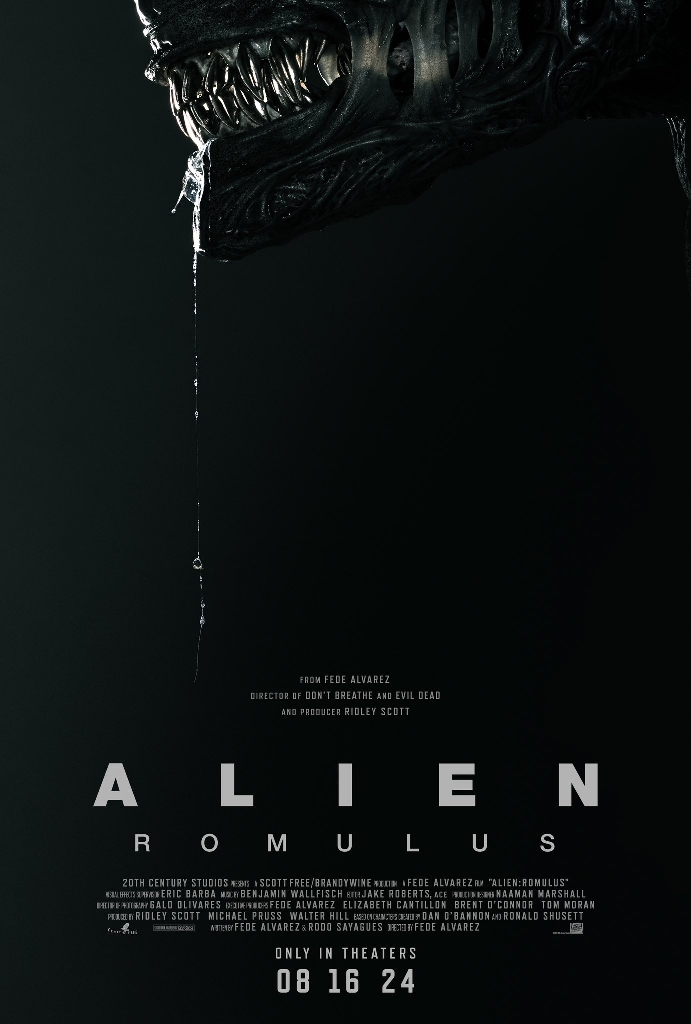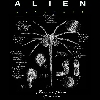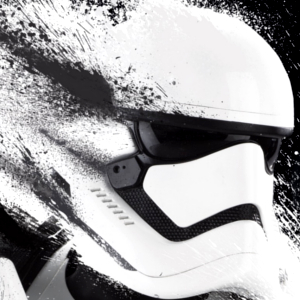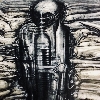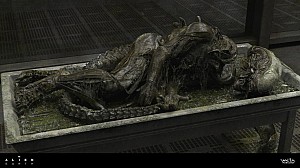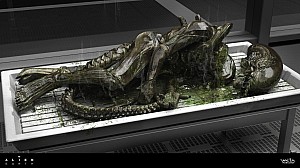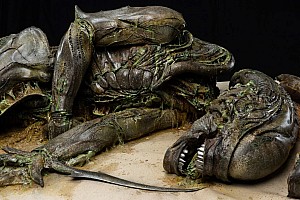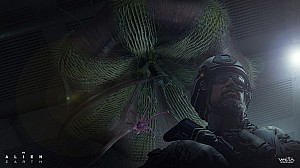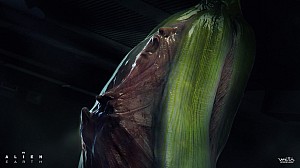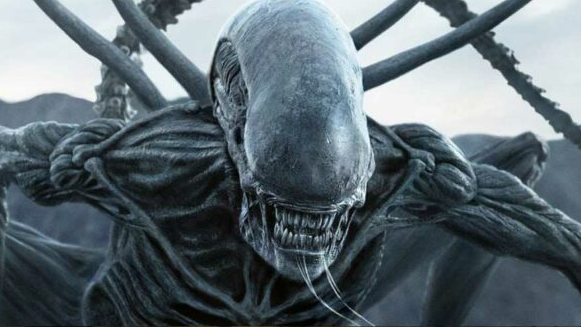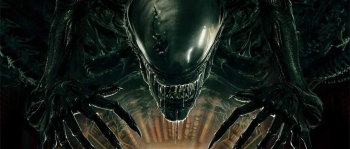Prior to Prometheus' release in 2012 fans, general audiences, and critics were praising the return of Sir Ridley Scott to the Alien franchise with Prometheus, the first movie in a planned series of prequels to the 1979 classic which the veteran British director had helped create. The grand imagery released through the marketing for the movie, the grand themes proposed in the movie's synopsis, the overwhelming investment from the studio, and an impressive cast of character actors created high expectations that Prometheus would be an epic science fiction movie that would explore the dark mythology of one of Hollywood's most iconic, prolific and creative intellectual properties. Sadly, despite Prometheus' nightmarishly beautiful visuals and grand mythological themes, poor characterization outside of the central cast, poorly advised editing, and evident changes in narrative direction throughout production resulted in a movie that at best, polarized opinion.

Initially written by Jon Spaihts, Prometheus was to be a direct prequel to Alien, with the events being set on LV-426, the Engineer dome/pyramid containing Ovomorphs (Xenomorph eggs), and the Juggernaut crashing when it's lone pilot gave birth to a Xenomorph gestating within its chest. However, during pre-production of the movie Damon Lindelof was hired to add a sense of ambiguity to the narrative. As such, the events were migrated to LV-426's neighboring moon LV-223, while the Xenomorph was transformed into a nondescript liquid (known as the Black Pathogen) that mutated anything it contaminated with traits of the Xenomorph, with its precursor, the Deacon, marking the creatures only appearance in the movie. The movies narrative direction away from the Xenomorph and instead toward the reimagined Space Jockeys; the Engineers, was to allow the mythology to explore grander themes beyond those of a movie monster that had, in Scott's eyes become derivative and tired; overcooked.

Paradise, the originally planned sequel to Prometheus was to explore the themes and mythology of its predecessor by following surviving characters David (Michael Fassbender) and Dr. Elizabeth Shaw (Noomi Rapace) on their proposed quest for absolution and resolution, moving the franchise even farther away from the iconic creature of the Xenomorph. Proposed to be a nightmarish reimagining of the Wizard of Oz using the design aesthetic of H. R. Giger, with narrative elements from Dante Alighieri's epic poem The Divine Comedy and John Milton's Paradise Lost, Paradise promised to be one of the most important movies in the history of science fiction cinema. Sadly, the overwhelming popularity of negativity towards Prometheus narrative decision to exclude the Xenomorph from the proposed series of Alien prequels led to Twentieth Century Fox and director Scott reimagining Paradise into Alien: Covenant; a sequel to Prometheus which would instead heavily feature the Xenomorph, and similar creatures. Another change in narrative direction, this decision was executed not to appease the fans that called for the Xenomorphs return, but rather despite them.

Scott reintroduced the Xenomorph in Alien: Covenant in an exercise of arrogance, to prove his prior statement that the 'beast was cooked'. Scott intentionally designed Covenants narrative and the creatures featured therein to adhere to established tropes and behavioral traits. This is evident from Scott's recent statements that he was 'ahead of the curve', and from the way in which the creature is under-utilized within the movie, of which fans, audiences, and critics have cited as overly-referential. Together with Covenants middling performance in theaters this summer, Fox and Scott have used the movie to push for yet another change in narrative direction for Alien Covenant's sequel, which is said to focus on the character of David, the dangers of AI and themes of identity and existence, despite calls from fans, audiences and critics alike that these narrative beats were explored and executed beautifully in Denis Villeneuve's sequel to Scott's 1982 science fiction noir classic Blade Runner; Blade Runner 2049, also released this summer.

For over forty years Sir Ridley Scott has proven to be one of Hollywood's greatest directors, able to create epic visuals and landscapes using a combination of groundbreaking advances in computer-generated imagery and well established practical effects. Together with having helped birth the Alien franchise with its creator Dan O'Bannon (and Ronald Shussett), artists H. R. Giger and Ron Cobb, and producers David Giler, Walter Hill, and Gordon Carroll, Scott has been afforded by studio Twentieth Century Fox virtual free reign and omnipotence in regards to the Alien franchise and its future, both within the confines of his series of prequels and extending outwardly towards any possible sequels. This became no more apparent when Neill Blomkamp's proposed sequel, titled Alien: Awakening was dropped by Fox despite the studio's reported support for the project following an overwhelmingly positive response from fans to the concept artwork released by Blomkamp. Considering that Deadpool was greenlit based on a similar response to released test footage, Fox's 'change of heart' against Blomkamp's project and Scotts acquisition of its title for his planned sequel to Alien: Covenant, together with Covenant's intentionally derivative portrayal of its titular antagonist highlights the influence the director has attained within the studio.

Claiming his vision to be definitive, Ridley Scott is using his belief that the iconic antagonist is 'cooked' to use the Alien franchise he 'helped' create to explore themes that should be complimenting the creature, not replacing it. Fans loyal to Scott continue to support the directors 'beast is cooked' comments by debating that the sexually violent connotations of the Alien and its effectivity as an on-screen antagonist were lost following the release of the 1986 sequel Aliens, directed by James Cameron, which reportedly reduced the 'murderous thief' of the first movie into a horde of mindless bugs. This is in contradiction to the influence Aliens has had on science fiction as a whole since its release. However, subsequent additions to the Alien franchise have seen the creature reduced to cannon fodder, with character concepts introduced in 1979 being squabbled over and retconned, as evidenced by AvP and Prometheus' misaligning origins for its corporate villain, Weyland Industries.

Scott's comments on the creatures viability has seen platforms such as Scified, AvP Galaxy, Mr. H Reviews, and Hybrid Network questioning whether or not the Alien franchise has a future beyond that of Scott's constantly contradictory series of prequels. While it is true that Blomkamp's sequel would have ultimately served only to appease fans of Cameron's aforementioned sequel Aliens, the future of the franchise no more lies with Scott's imaginings of its past than it did with Sigourney Weaver's prolific portrayal of Ripley. The central character of any Alien movie should be the Alien itself, the Xenomorph, which is no more 'cooked' than any other antagonist in any other franchise. Ironically it is Scott himself that highlighted the direction the franchise should take with his comments regarding the creature in Alien: Covenant's pre-release marketing. This has been proven time and again across other franchises which have reinvented their core characters and introduced new characters to exceed and circumvent the expectations of audiences, such as Robert Patricks menacing T-1000 in Terminator 2: Judgment Day, or Bill Skarsgard's delightfully disturbed Pennywise the Clown in Andy Muchietti's IT.

What the Alien franchise needs is a reminder of why we fell in love with the franchise in the first place; through a portrayal of the Xenomorph that moves away from the animalistic scuttlings of previous depictions towards that which was inferred but never depicted in the original movie; a malicious, cruel and murderous creature with intent and intelligence. With the right director and production team, such a reinvigorated antagonist set amidst a narrative backdrop that expands the universe within which it is set, and explores new themes and characters previously unseen would prove that the Xenomorph as an antagonist is far from 'cooked' and that the franchise can propagate without the need to pamper to Ridley, Ripley or Cameron fans.
Sadly with Scott's grip on the franchise seeming to ever tighten while drifting away from the core concepts that made it so iconic it is highly unlikely that a true 'Alien' movie will be developed any time in the near future.
The next Alien movie
The state of the Alien: Romulus sequel remains uncertain. Production was originally supposed to have begun in October of 2025 but little news has surfaced. Be sure to bookmark the Alien: Romulus 2 Info Page for an up-to-date account of all available information, production updates and important details!
In addition to the upcoming Alien: Romulus sequel, we have the Alien: Earth TV series from Noah Hawley now streaming and a rumoured Alien vs. Predator reboot in the works as well!
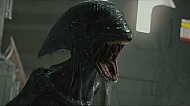
Ridley Scott’s Alien prequel Prometheus is currently #3 on Netflix's Top 10 Movies list!
The controversial Alien prequel from 2012 which introduced Engineers and an alternative history to Xenomorph origins is currently finding new popularity on Netflix!
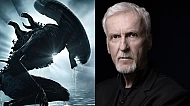
James Cameron: You couldn't pay me to go back to the Alien franchise – it's too fan driven.
Sitting down with actor Michael Biehn, Cameron talks Alien 3, touches on Alien: Earth, Romulus & explains why he will never go back to the Alien franchise.

Alien fans want another Alien prequel over Romulus 2 or anything else, according to new online survey!
It appears fans of the Alien franchise have grown tired of the same narratives being recycled and are finally embracing the idea of another Alien preq...


